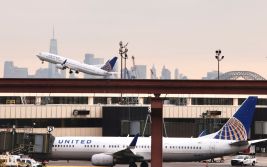CNN to study drone use for newsgathering

(Credit: iStockphoto.com)
The Federal Aviation Administration has yet to issue its past-due notice of proposed rule-making on small unmanned aircraft systems, but CNN announced Jan. 12 that it had entered into a Cooperative Research and Development Agreement with FAA in order to examine the use of drones for newsgathering and reporting.
According to a release from CNN, it will center its drone efforts on Atlanta and will work with the Georgia Tech Research Institute. CNN will provide data from the initiative to FAA, which will use it to “formulate a framework for various types of [unmanned aerial vehicles] to be safely integrated into newsgathering operations.”
“We hope this agreement with CNN and the work we are doing with other news organizations and associations will help safely integrate unmanned newsgathering technology and operating procedures into the national airspace system,” FAA Administrator Michael Huerta said in a statement.
Neither CNN nor the FAA responded to FedScoop’s requests for comment on the news organization’s operation of the systems and the extent of the authorization.
“Our aim is to get beyond hobby-grade equipment and to establish what options are available and workable to produce high-quality video journalism using various types of UAVs and camera setups,” David Vigilante, CNN’s senior vice president, said in the release. “Our hope is that these efforts contribute to the development of a vibrant ecosystem where operators of various types and sizes can safely operate in the U.S. airspace.”
Two more exemptions
Last week, FAA also issued the first exemption permit for real estate photography to a Tucson, Arizona, realty company. Owner Douglas Trudeau can now legally operate a Phantom 2 Vision quadcopter to film and photograph properties for real estate listings.
On a statement posted to Trudeau’s realty company website, The Trudeau Group, the realtor said he was excited about the exemption.
“It has been a long six months to get this far. There are conditions and hurdles to concur [sic], but progress has been made,” Trudeau said. “My dream for offering more for my clients to create a high quality visual representation of their home is evolving with now aerial views of homes that can take advantage of this great technology.”
Alongside the exemption for Trudeau, FAA also granted Advanced Aviation Solutions the authority to fly a fixed-wing eBee Ag UAS in Spokane, Washington, to take photographic measurements and perform crop scouting for precision agriculture.
While neither Trudeau nor Advanced Aviation Solutions need to obtain a separate FAA certificate of airworthiness for their crafts, they need a certificate of waiver or authorization for the specific airspace they will operate within.
The two new exemptions bring the number of exempted operations to 14. As of Jan. 6, FAA said it had received 214 requests for exemptions for commercial entities.
Drone enforcement
While industry awaits regulations for commercial drones and commercial UAS operation, the agency did release guidance for law enforcement on UAS use. According to an FAA statement, state and local police are often in the best position to investigate the unauthorized use of UAS and, in some cases, to stop that use.
“The FAA’s goal is to promote voluntary compliance by educating individual UAS operators about how they can operate safely under current regulations and laws,” FAA said in a statement. “The guidance makes clear the agency’s authority to pursue legal enforcement action against persons who endanger the safety of the national airspace system.”
The 12-page document also details the prohibition of UAS around presidential movements, the District of Columbia restricted flight zone, power plants, sporting events and theme parks.






